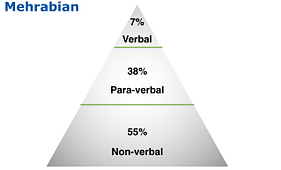Communication Filters

Just as we perceive the world through our perception filter, we communicate with this same filter
It is therefore possible to identify the way we communicate by observing three different things:
- The verbal: words
- The para-verbal: everything related to the voice: timbre, rhythm, sound level, etc.
- The non-verbal: everything related to the body, its functioning, posture, facial expressions
Each personality type will have coherent behaviour related to its expression (its communication filter) with:
- specific words
- a voice that is more or less modulated
- gestures that are more or less expressive
Further information
These three criteria were identified by Merhabian in 1971
Merhabian’s work:
His work consisted of asking actors to say very aggressive things to an audience with friendly gestures and a friendly voice, and then reversing the experience, by asking the actors to say kind things with an aggressive voice and aggressive gestures.
Three things emerged from his studies that influence the impact of the message:
- Verbal : the words we use
- Para-verbal : everything related to the voice; timbre, rhythm, sound level, etc.
- Non-verbal : everything related to the body; functioning, posture, facial expressions
The impact of the message in these experiments was measured in the following ways: 7% – verbal; 38% para-verbal; 55% non-verbal.
The cartoon character, Droopy, is a great illustration of the dissonance between words and para-verbal and non-verbal language: “You know what? I’m Happy!”

Réponses